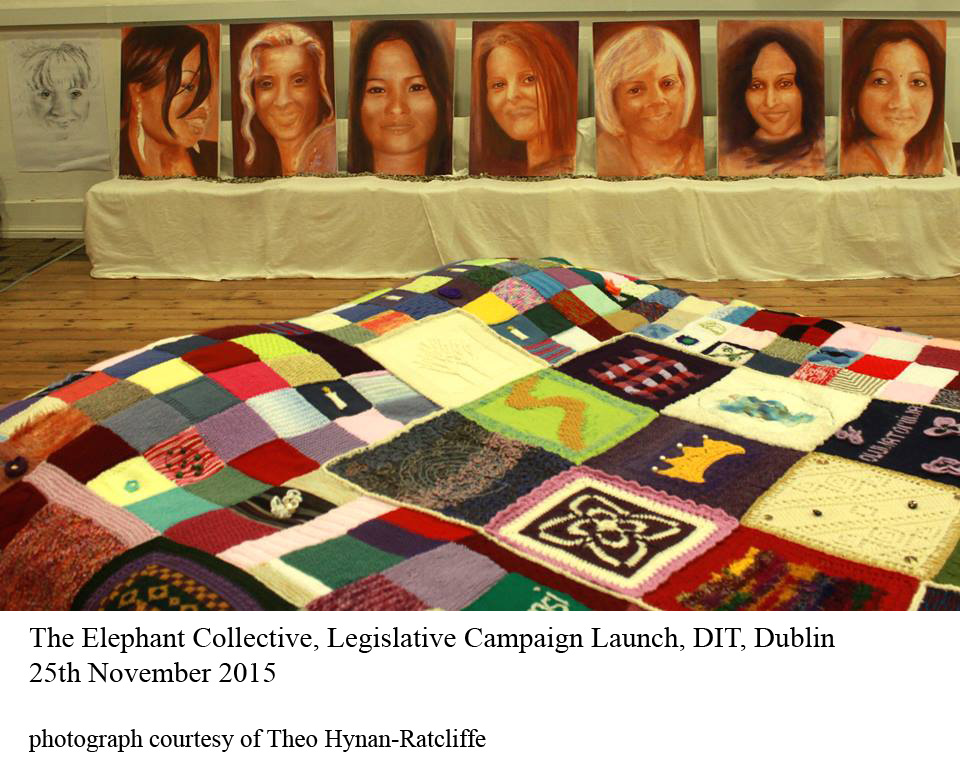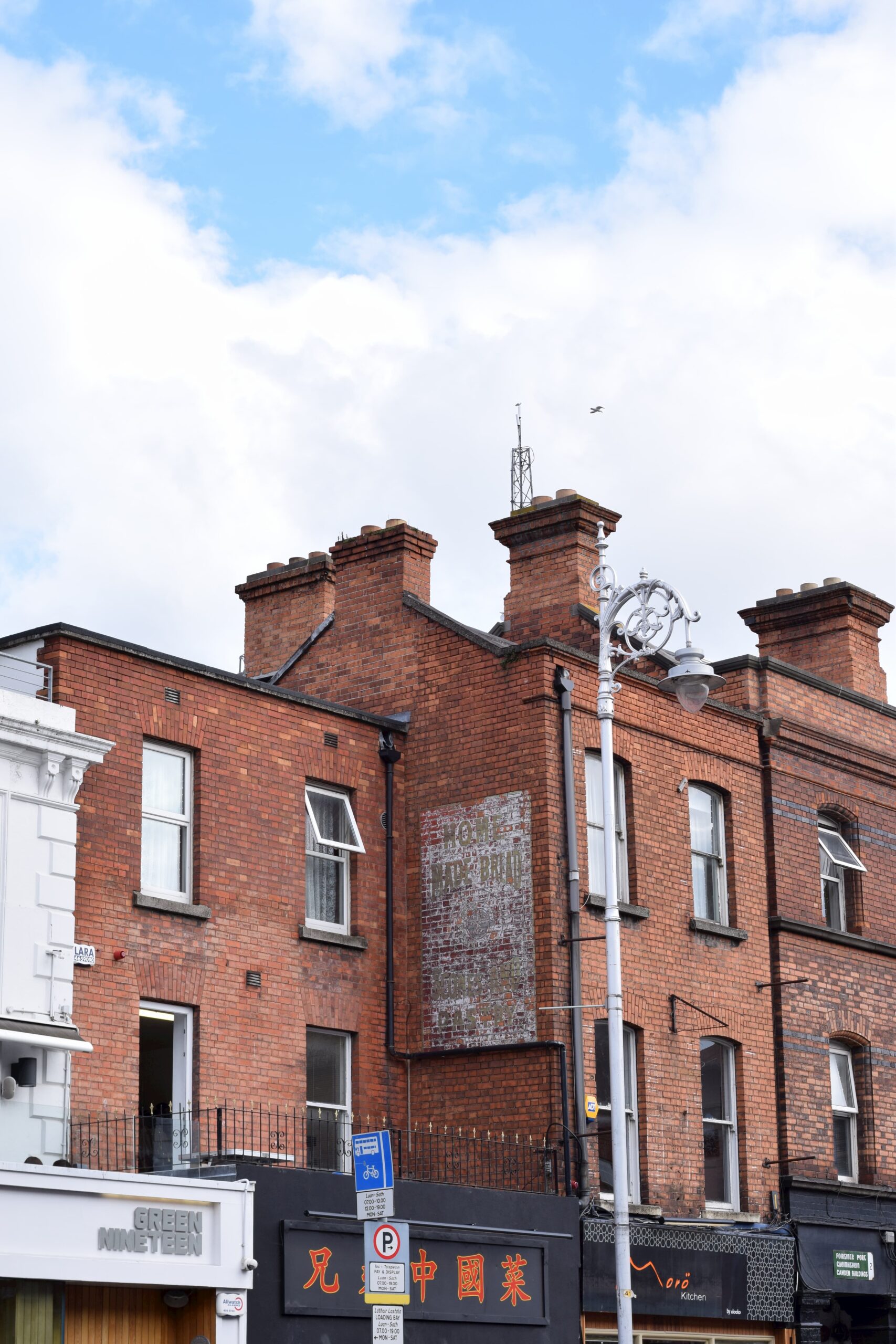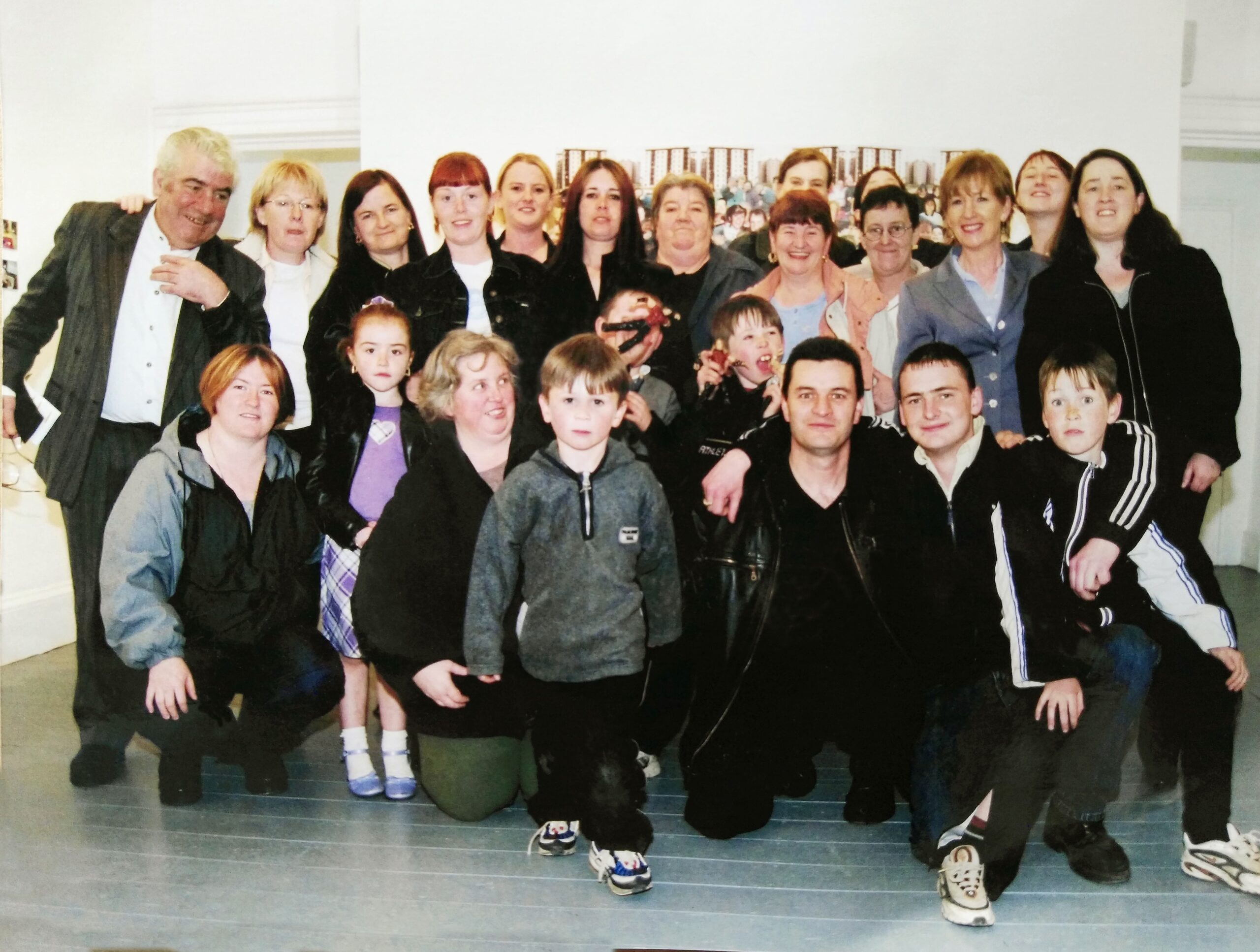DRI is pleased to announce that three community-based archive initiatives have been chosen as the winners of this year’s Community Archive Scheme: The Elephant Collective, Dublin Ghost Signs, and Dublin-based Community Films by Joe Lee.
As a publicly funded repository, the Digital Repository of Ireland (DRI) believes it is important to make long-term preservation of digital materials open to a wide range of organisations, including those operating on a no or low-funded, voluntary basis. We, therefore, offer free DRI associate membership and all the related benefits as part of our DRI Community Archive Scheme.
We are pleased to announce that three community-based archive initiatives have been chosen as the winners of this year’s Community Archive Scheme: The Elephant Collective, Dublin Ghost Signs, and Dublin-based Community Films by Joe Lee.
Acting Education and Outreach Manager Áine Madden noted that:
Our decision to award three Community Archive Scheme recipients this year is in recognition of the exceptional standard of the winning applications and the significance of the collection material, which promises to enrich the digital cultural memory of Ireland. The decision is also informed by DRI’s commitment to playing our part during the COVID-19 crisis by offering extra preservation support for at-risk collections during this challenging time. We also wish to continue working to increase our support for community-based archival initiatives by sharing our resources and digital preservation skills with community memory workers and through highlighting voluntary archival labour in outreach events.
It is very fitting that the announcement of the winners of the DRI Community Archive Scheme is being made on World Digital Preservation Day 2020, as part of a global celebration of the positive impact digital preservation has for good during a year in which reliance on access to digital heritage data has become more important than ever.
About the Winners
The Elephant Collective
The Elephant Collective is a voluntary group of birth activists, educators, student midwives, and artists that worked with the parliamentarian Clare Daly MEP (then TD) from 2014 to 2019 to secure new legislation that would make inquests into all maternal deaths in Ireland both automatic and mandatory. In 2019, they succeeded in ensuring that the Coroners (Amendment) Act 2019 passed into legislation.
The campaign was initiated by sociologist Dr Jo Murphy-Lawless and midwifery students in Trinity College Dublin who began a knitted quilt to show solidarity with families who had lost a loved one to maternal death. Very quickly, more than 150 people contributed knitted squares to this quilt which became the focal point of the evolving multimedia art exhibition, ‘Picking Up the Thread: Remaking the Fabric of Care’, which toured nationally, over 5 years, raising awareness for the urgent need for this new legislation.
 Image caption: Knitted quilt from The Elephant Collective Campaign launch, 2015
Image caption: Knitted quilt from The Elephant Collective Campaign launch, 2015
At the centre of the new law which passed into legislation in 2019, is the regulation that all maternal and late maternal deaths, regardless of location in or outside a hospital, are now subject to mandatory inquests and thus to full public scrutiny.
Ireland is the first country in Europe to have passed specific legislation about maternal death inquests.
The Elephant Collective campaign materials include a rich variety of objects in different formats such as MP3 audio files, video, film footage, radio interviews, photographs, and social media material. Jo Murphy-Lawless, Martina Hynan, and Doreen Fitzmaurice stated on behalf of the Collective that:
We applied to the DRI Community Archive Scheme because we felt that their ethos to openly preserve and share community archives is of fundamental importance in extending the reach of grassroots activism as a meaningful undertaking. To go one step further to help non-funded community organisations such as ours to achieve this is an incredible commitment to the principles of social justice here in Ireland and beyond. We have been so eager to ensure that the cumulative efforts of many hundreds of people across the country which have brought The Elephant Collective into being would be meticulously preserved. This award from the DRI will now make that fully possible and we are truly thankful for this opportunity.
The campaign materials that form part of The Elephant Collective collection are extremely important both in terms of illustrating Ireland’s commitment to upholding human rights, and in highlighting the immense effort that went into the six-year grassroots legislative campaign to secure automatic mandatory inquests for all maternal deaths in Ireland. The collection is a testament to the hard work of the campaigners and will be a rich resource for researchers, both nationally and internationally, who wish to learn more about the example set by Ireland as the first country in Europe to have passed specific legislation about maternal death inquests.
Dublin Ghost Signs
Ghost signs are the old and typically hand-painted signs of advertisements and businesses that have closed their doors for the final time. In Dublin, these signs are everywhere – on walls, above buildings, and on tiled mosaic doorsteps. Dublin Ghost Signs is an online collection of Dublin’s old and fading signs which have stood the test of time.
Emma Clarke started the Dublin Ghost Signs website in 2013 as a side project to practice the web technology skills she was learning as part of the MPhil in Digital Humanities course in Trinity College Dublin. The website was inspired by a thread on an Irish message board site (boards.ie) which shared photos of Dublin’s ghost signs.
The signs in the collection provide a glimpse into the city’s past – its shops, businesses and advertising. Ghost signs are ephemeral in nature, and are often only uncovered for a short space of time, while work is being done on a building, and they can often disappear as quickly as they appear. Many of the signs in the Dublin Ghost Signs collection have in fact disappeared, been demolished or destroyed since Emma photographed them. In certain cases, the only photographic proof of their existence is within the collection.
These valuable visual records of Dublin’s past are also at risk because websites and social media sites are precarious platforms that tend towards loss and disappearance, as Emma found out when 16 months of updates to the website that hosted the ghost sign images disappeared without warning and were only restored through a laborious process of recovering the content from data backups.
Commenting on the value of being able to preserve Dublin Ghost Signs in the DRI repository for long-term access, Emma stated:
I am absolutely delighted to receive one of DRI’s Community Archive Awards this year. Dublin Ghost Signs is a visual record of Dublin’s old and fading commercial signs during a period in which the city has undergone massive change. It is so easy to lose access to online digital collections like Dublin Ghost Signs, but by becoming part of the Digital Repository of Ireland, we can ensure the long term preservation of this photo collection, so it will be available for generations to come.
The image below from the collection of a faded ghost sign on Camden Street is approximately 100 years old. Painted for Jennie Wyse Power’s ‘Irish Farm Produce Company’, the sign was an advertisement for homemade bread, scones, and pastry. It features the circular ‘Déanta I nÉirinn’ logo (Made in Ireland) which was commonly used in the early 20th century. These forgotten and faded signs hold the secrets of Dublin’s commercial past.
 Image caption: Faded ghost sign on Camden Street, Emma Clarke, Dublin Ghost Signs
Image caption: Faded ghost sign on Camden Street, Emma Clarke, Dublin Ghost Signs
Dublin Ghost Signs offers a socially and historically important insight into Dublin’s commercial past. The collection will be a significant resource for history and sociology researchers or indeed, anybody interested in visual collections which illustrate the changing landscape of a city. We look forward to working with Emma on preserving this collection.
Dublin-based Community Films by Joe Lee
Joe Lee is an independent film and video maker. Since the early 2000s, Joe has been making a series of community-based films set in Dublin neighbourhoods that present a unique insight into the recent social history of the city from the 1980s onwards. These projects include: Dreams in the Dark (2002), Dark Room (2002), Inside Out Outside In Stories from O’Devaney Gardens (2007), Bananas On The Breadboard (2010), CityWide (2011), The Area (2012), Fortune Wheel (2015) and Barracks Square Estate (2017).
A number of the films revolve around regeneration projects in Dublin 3, 7, and 8, while others arose out of curiosity or collaborations with artists or community development workers. All of the films feature a wide range of interviews with local people who speak about their own experiences and stories from their communities in the context of the ever-changing city.
The eight community-based films in Joe’s collection offer an important social and cultural history of Dublin and are especially relevant in terms of providing a record of oral histories of working-class Dublin communities. They are not currently preserved in an archive and are at risk of future erasure. Speaking about the consequence of his win for the long-term preservation of the films, Joe commented that:
I have been making films with and about Dublin communities for more than 25 years now. Always at the centre of these films are the voices and experiences of the people and communities whose stories are being told. Until now, none of these films have been preserved in city or national archival collections. I am, therefore, delighted that this work is now finding a permanent archival home at the Digital Repository of Ireland where future generations can have access to the rich oral and visual histories that are contained in these Dublin Films.
The photograph below was taken in 2001 in the East Floor Galleries of the Irish Museum of Modern Art (IMMA). It is significant because many of the people featured here with Joe Lee (third right, front row) took part in an art project called ‘Out Of Place’ which explored the story of a local neighbourhood – St Micheal’s Estate, Inchicore, Dublin. The project was a collaboration between a community development project, The Family Resource Centre St Michael’s Estate, the then outreach Dept of IMMA, and Joe Lee (Arts Council, Artist in the Community Scheme). The ‘Out Of Place’ project produced exhibitions in IMMA and in St Michael’s Estate but also two films which will be preserved for long-term access in the DRI repository: Dreams in the Dark (2002) and Dark Room (2002).
 Image caption: Joe Lee (third right, front row) with a group from St Michael’s Estate Family Resource Centre at the Irish Museum of Modern Art 2001
Image caption: Joe Lee (third right, front row) with a group from St Michael’s Estate Family Resource Centre at the Irish Museum of Modern Art 2001
The Dublin-based Community Films collection by Joe Lee will be a rich resource for history and sociology researchers. Like Dublin Ghost Signs, it also complements and enriches other Dublin-based cultural collections contained in the repository, such as the Dublin City Library and Archive collections.
Final Thoughts
DRI’s Programme Manager, and chair of the judging panel, Lisa Griffith remarked that:
The judging panel were impressed by the range and quality of this year’s applications and they highlight the at-risk nature of much of the community work which is being undertaken in Ireland today. We are delighted that we can play a small part in preserving some of that work to make sure this work is not forgotten and that it continues to be made available for future researchers. The collections which will arise from these three winning applications align closely with our current collections and research projects and will add depth and greater context to material we already hold in the repository.
This is the third edition of the DRI Community Archive Scheme. The first winner (2019) was the Cork LGBT Archive, a collection that aims to preserve and share information about the rich history of Cork’s Lesbian, Gay, Bisexual, and Transgender Communities. The collection has been preserved for long-term access in the DRI and can be browsed in the repository here. The second winner (2020) was the Asylum Archive, which includes almost 6,000 photographs, academic essays, audio interviews, and publications that document life under Direct Provision, collected by artist, activist, and scholar Vukašin Nedeljković, a former resident of a Direct Provision Centre. Cork-based organisation Frameworks Media and Archive Centre was also recognised in the Community Archive Scheme 2020 and their collection will soon be published in the repository.
The collections represented by this year’s winners – The Elephant Collective, Dublin Ghosts Signs, and Dublin-based Community Films by Joe Lee, were created in response to different community needs, such as the need to effect change, to record a city’s vanishing past, or to document the stories of a specific group of people. None of these collections would exist without the voluntary archival labour of individuals who have devoted time, effort, and skill to collecting this culturally, socially, and historically significant material. DRI is privileged to be able to offer support in preserving the archival labour of these community-based archival initiatives so that the collections continue to be preserved into the future and are freely accessible to everyone.






